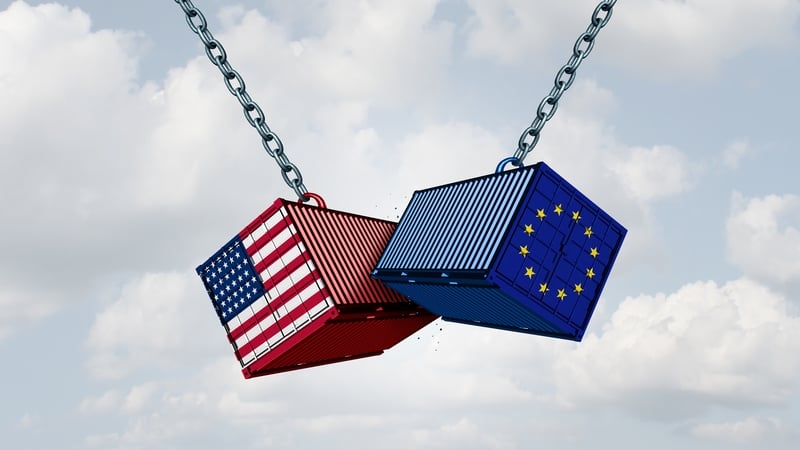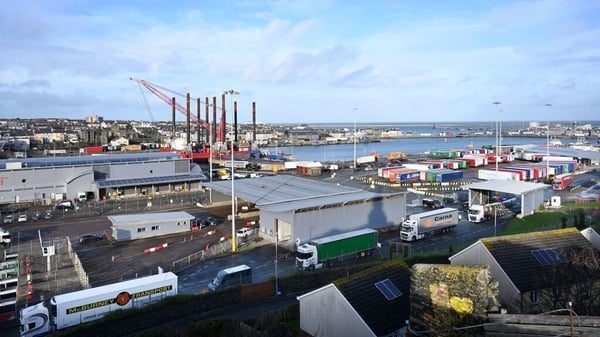US President Donald Trump is proposing new tariffs on 2 April. So far, the situation remains fluid, and no final decisions appear to have been made.
President Trump will ultimately determine the contents of the 2 April announcement, which he has touted as "Liberation Day" for the US economy.
The action aims to shrink a $1.2 trillion global goods trade deficit by raising US tariffs to levels charged by other countries and counteracting their non-tariff trade barriers.
With exports incredibly important to the Irish economy, this uncertainty and threat to the value of our exports is causing growing concern.
Chief Executive of the Irish Exporters Association Simon McKeever said he has "no doubt" that Ireland will be hit under some level of tariff.
Why should Ireland be worried about tariffs?
These tariffs are worrying because Ireland has built a lot of its economic growth and expansion from a period of globalisation and economic policy of free trade around the world.
The Government has warned that up to 80,000 jobs which could be created in future may not proceed in Ireland's multinational sector - if President Trump launches a trade war with the EU.

It is expected that he will target these jobs as part of an effort to repatriate jobs and taxes to the US.
Ireland is a small open economy which is reliant on other markets for its exports to do well, and any change to this approach puts a risk factor over that growth.
Chief Economist with Deloitte Ireland Kate English says Ireland has an exposure to exports of medical and pharmaceutical products to the US.
"Medical and pharma products exported to the US accounted for 20% of total good exports in Ireland in 2024, and they accounted for about 61% of your total goods exported to the US," said Ms English.
"Any change in that external trade environment changes the dynamic of how our exports could potentially perform and that could have a knock-on impact to our wider economic growth story."
According to the Irish Exporters Association the US market has been seen as a growth market for Ireland in recent years, and tied in with the strong two-way relationship the countries had with each other.

It’s concerned that any tariff on an Irish product will make it more expensive in the US, potentially making it less competitive there and that’s why we should be worried about tariff increases and the impact on the cost of Irish goods there.
EU trade commissioner and the bloc’s top trade negotiator Maroš Šefčovič expects the US to hit the EU with tariffs of about 20% next week.
This would pose significant threats to Ireland by hitting the competitiveness of products made here on the US market.
How much does Ireland export to the US?
The US is Ireland's largest export market, with a significant portion of exports consisting of medical and pharmaceutical products.
The Central Statistics Office’s first estimates for 2024 show that total Irish exports were valued at a record €223.8 billion, and imports were valued at €133.6bn.
These figures show that exports of goods to the United States were €72.6bn in 2024, up €18.6bn (+34%) on 2023, while imports of goods from the US were €22.5bn, a decrease of 2% on 2023. Pharmaceuticals goods made up €58bn of exports to the US last year.
CSO figures for 2023 show that the US accounted for 28% of the total value of Irish exports at €54bn.
The second biggest export partner was the UK, with €22.4bn of exports, followed by Germany with €20.4bn.
Belgium and the Netherlands complete the list of the remaining top 5 export markets.
President Trump has said they will be introducing tariffs on pharmaceuticals and specifically cited Ireland among the countries where many pharmaceutical products are made.
Mr Trump said the tariffs on pharmaceuticals are aimed at bringing the industry back to the US. He said: "Ireland was very smart. We love Ireland. But we are going to have that".
Minister for Finance Paschal Donohoe has said he is "extremely concerned" about the potential impact of proposed United States tariffs on pharmaceutical exports, warning they could deliver a major blow to Ireland’s economy.
What impact could tariffs have on Irish exports?
Tariffs could have both a direct and an indirect impact on Irish exports.
The direct impact is that Irish goods will become more expensive in the US. If people have a limited budget, they might not continue to buy them and choose a cheaper option instead.
The indirect impact is on Irish companies who sit in the supply chain of goods that are finished elsewhere.
For example, if a tariff is put on an intermediary good that is produced in Ireland as part of a product that is finished in another country, it would make the Irish component more expensive and less attractive.
"Our main concern is that tariffs don't benefit anybody in a globalised economy," said Mr McKeever.
"The impact that this will have on the domestic economy in the states is that it will force inflation up and probably put the United States into a recession beginning within the next two years.
"The problem then is does that tip off recession everywhere around the world."
We need your consent to load this rte-player contentWe use rte-player to manage extra content that can set cookies on your device and collect data about your activity. Please review their details and accept them to load the content.Manage Preferences
Speaking on RTÉ’s Morning Ireland, ESRI Research Professor Kieran McQuinn said there is "no doubt" that US tariffs would have a negative impact on jobs, activity and investment.
"We’re looking at this year and next year in our forecast horizon. These tariffs, if they come in, and if they come in at a persistent basis, will have a negative effect for many, many years. You’re talking about a five, up to ten-year horizon in terms of their effect," he said.
What are the potential knock-on effects of tariffs on the wider Irish economy?
The ESRI and Department of Finance published a report which calculated that tariffs could cost Ireland more than €18bn in lost trade and pose a long-term risk to the public finances.
This report assessed the impact tariffs and wider trade barriers could have on the Irish economy.
The sectors that are most exposed include pharma and tech manufacturing where we often see higher wages among employees in these areas.
A secondary impact of these sectors being affected includes a possible reduction in employment levels or activity.
This in turn could have a knock-on effect on the overall level of consumer demand.
"There could be an impact to our VAT receipts that comes from that consumer spending that takes place," said Ms English.

"And if there's a reduction in your employment within those sectors, there's also the potential impact on income tax receipts.
"It's the immediate sectors that are most exposed to it, but it's also then those knock on secondary impacts that can be potentially felt within our economy as well."
What is Ireland’s biggest weakness when it comes to tariffs?
Ireland relies quite significantly on exports for its economic growth so if there is a change in how exports perform, it will be felt quite quickly in its wider economic growth indicators.
For example, looking at the sectors that more most exposed from an export perspective, medical and pharmaceutical and tech manufacturing are critical parts of Ireland’s overall growth story.
It there’s slower growth within these sectors it will be felt in other parts of the domestic economy.
Would Ireland be affected worse than other EU countries?
Until the tariffs are introduced, we don’t know what Ireland is trying to absorb or adjust from an economic standpoint with.
What we do know is that Ireland is a small open economy, heavily reliant on exports for overall GDP growth levels and that’s different to some other countries which rely on consumer spending for economic growth.
This means Ireland is more vulnerable if there is a change to how we see the movement of goods taking place.
"There's no way that there won't be a negative fallout from this for Ireland if tariffs are introduced"
It could have a very significant impact on our overall GDP figures and potentially a larger impact than what we see in the UK or in some other European countries.
However, more positively, Ms English highlights that Ireland is coming into this riskier situation in a better position that some EU countries.
Ireland has had several years of strong economic growth, strong labour markets and consumers or households that are in - at an aggregate level - quite good financial positions.
"We're still seeing growth in that household deposits and growth in savings, and there’s been very limited movement in mortgage arrears," said Ms English.
"That strong economic growth that has been there for the last few years place Ireland in a good position to begin with, to try and absorb some of the pain that will be felt.
"There's no way that there won’t be a negative fallout from this for Ireland if tariffs are introduced, many other European countries will be entering this very uncertain risk year period off the back of a number of years of where they have struggled to see economic growth, with Germany being a prime example."
How are affected sectors reacting?
The Irish Exporters Association said the uncertainty and chaos surrounding what President Trump is going to do is not helpful to anybody, and people are worried about the effect it will have on their business and their livelihood.
It’s concerned that if exports slow and Irish companies sell less and if the economy slows down, that there will be a massive impact in the long term in Ireland.
CEO Simon McKeever said there’s a lot of attention focused on the FDI community here, but a lot of Irish-owned businesses are also exporting into the United States and have strategic plans that see them growing over there.
"I have no doubt Ireland will be hit with tariffs as part of the tariffs leveled against the European Union," said Mr McKeever.
"Beyond trade, the impact on FDI cannot be overstated"
"I absolutely urge all companies to do an assessment on their inbound and outbound supply chains and measure the risk that they have, the exposure that they have against different tariff levels, and what does that mean for their business, do they do they need to source supply elsewhere."
A study by global strategic consultancy Sia found that any potential 'Trump tariffs’ and protectionist measures could disrupt Ireland’s €58bn pharmaceutical exports to the US, leading to reduced investment in the longer term, potential job losses and a reduction in corporate tax.
Associate Partner at Sia Niall Cunneen warns that trade tariffs could be both immediate and far-reaching, threatening the very foundation of Irelands export-driven success.
"Beyond trade, the impact on FDI cannot be overstated. US companies have long viewed Ireland as a strategic base for European operations, not only because of its business-friendly environment but also due to its close economic ties with the US," said Mr Cunneen.
"If tariffs introduce instability into that relationship, US firms may hesitate to expand their Irish footprint, investing in the next generation of biopharma plants outside of the EU, or within the US, potentially leading to slower job growth, lower corporate tax receipts and even corporate relocations."
The Trump administration tariffs pose a significant threat to Irish Food and Drink Exports.
Last year, Ireland exported approximately €1.9bn worth of food and drink products to the US.
IFA President Francie Gorman said the US market accounts for around 11% of total food and drink exports.
"We have succeeded in gaining a foothold in what is a large market. Not only that, but we have done it with some very strong brands that are built on the foundation of farmers producing quality material for processing.
"The scale of the tariffs being talked about would have a serious impact on what we have achieved," he said.





